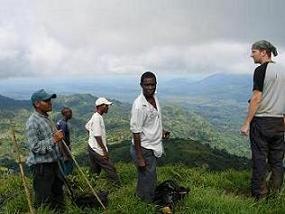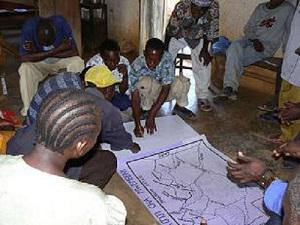Johanna Kolemainen
Other projects
This project aims to explore the possibility of developing community-based ecotourism as a strategy to integrate forest conservation and community development in Magoroto and Mlinga forests in the East Usambara Mountains, NE Tanzania.

The project applies two strategies to help conserve the forest remnants on the Magoroto Hills and the Mlinga Mountain. One is to develop community-based ecotourism, which is expected to enhance the livelihood of the people, help preserve their culture and increase their motivation for nature conservation. Another strategy is to train and capacitate the people in forest conservation techniques. These two strategies will be implemented hand in hand in order to promote sound integration of conservation and community development. A special conservation target and a biological flagship of the project is the endangered forest plant Saintpaulia, which attracts eco-tourists to the region.

Tourism trainees drawing attraction map.
Activities in the project phase II (Sept 2009 – Aug 2010) are the following:
1. As an introduction to the project, basic training will be offered for resource persons in the new target village on the conservation and sustainable use of the forest, sustainable agriculture and Saintpaulia conservation.
2. To initiate tree planting in the area, selected farmers will be trained in tree nursery establishment and management. Thereafter, the trained farmers will establish their own nurseries.
3. To reduce farm encroachment into the forest, productivity and sustainability of the existing farmland will be increased by training selected farmers. The farmers will implement the techniques they learned on their own farms that will also serve as learning sites for other farmers.
4. Representatives will be elected for the Magoroto Mlinga Conservation and Ecotourism Association (MAMCEA) from the new target village.
5. Basic renovation for the Conservation and Ecotourism Association’s office that will serve as a base for the association and as a visitor information centre.
6. An introductory course on tourism for resource persons in the new target village.
7. A promotional tour to the project area for representatives of the regional tourism industry.